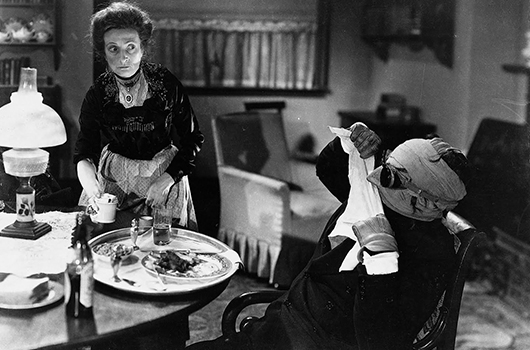
Invisible Man, The (Universal 1933)
A new look at horror’s unseen icon…
In his review of The Invisible Man published on November 18, 1933 by The New York Times, Mordaunt Hall writes:
“Claude Rains Makes His Film Debut in a Version of H G Wells’s Novel, The Invisible Man. No actor has ever made his first appearance on the screen under quite as peculiar circumstance as Claude Rains does in the picturisation of H G Wells’s novel The Invisible Man, which is the chief attraction at the Seventh Avenue Roxy. Other players have, it is true, been thoroughly disguised by weird make-up, but in this current offering Mr Rains’s countenance is beheld for a mere half minute at the close of the proceedings. The rest of the time his head is either completely covered with bandages or he is invisible, but his voice is heard.”
The third horror film made by James Whale was The Invisible Man, released by Universal Studios on November 13, 1933 (USA). The film was produced by Carl Laemmle Jr, R C Sheriff based his screenplay on the H G Wells novel, The Invisible Man. Arthur Edeson was the Director of Photography. Art Director: Charles D Hall. Jack Pierce was the Makeup Artist. Special Effects: John P Fulton. The Editor was Ted Kent. Composer Heinz Roemheld provided the score. Whale was a great director and made many successful films in other genres. However, those films are almost forgotten now. It is the four horror films that he is best remembered for. Films that are not only some of the best in the horror genre – but are still the most influential of our time: Frankenstein (1931), The Old Dark House (1932), The Invisible Man (1933) and Bride of Frankenstein (1935). Quite an accomplishment for a director who cared not to dabble too long in the macabre.
Still, The Invisible Man is more science fiction than horror. The horror is in what happens to Griffin. His sanity, wisdom, morals and understanding are completely destroyed by the chemicals used to gain invisibility. He has no empathy for a single living thing. His love for Flora still exists. A love surely fading fast behind a power mad scheme for complete domination over mankind. The chemicals have turned Griffin into a stone cold sociopath. A sociopath has no regard for the feelings or well being of others. There are no thoughts of remorse or disgrace. They manipulate, lie and are usually driven by an unparalleled egomania.
All these elements are clearly brought to the forefront by the dynamic performance of Claude Rains. While The Invisible Man features a very skilled cast, the presentation offered by Rains leaves those of his colleagues far behind. With the use of some superb special effects, he carries the bulk of the film with just his voice. In scenes where he is shown, clothed and swathed in bandages, his acting is showcased by his mannerisms and the articulation of how he delivers the dialogue. Rains then provides his character with a maniacal laugh. One that not only instills humor at times, but also fear – for it depicts the level of madness taking place. One of the finest debut performances in American films.
As he walks through a heavy snowstorm, Dr Jack Griffin (Claude Rains) approaches the small town of Iping, England. Attired against the elements, Griffin wears a heavy overcoat and fedora hat. His face is completely wrapped in bandages and his eyes are shielded with thick black goggles. Entering the Lion’s Head Inn, he demands a room, a fire and some food from Innkeeper Mr Herbert Hall (Forrester Harvey) and his wife Jenny (Una O’Connor). The patrons of the Inn cannot take their eyes off this mysterious stranger as he is led to his room. Griffin wishes to be left alone and undisturbed. Mrs Hall lights a fire, then departs for Griffin’s supper. Upon returning to the kitchen, Mrs Hall discovers that Minnie (Merle Tottenham) has forgotten the mustard:
“You’ll be the death of me with your slowness. Here you let me take the gentleman’s supper in and forget the mustard! And him wanting to be left alone.”
Mrs Hall bursts into the room without knocking and Griffin hurriedly covers the lower portion of his face, reminding Mrs Hall: “I told you not to disturb me.” Mrs Hall apologises, leaves the mustard and hurries downstairs. Griffin lowers the napkin, and the lower half of his face is gone! For Griffin is a chemist who has discovered how to make himself invisible. Meanwhile, a frightened Mrs Hall tells her husband:
“Bandages right up to the top of his head, all around his ears… No blood. Looks like some sort of horrible accident.”
Nearly a month has passed, and Griffin’s employer Dr Cranley (Henry Travers), works in his laboratory. He is interrupted by his daughter Flora (Gloria Stuart), who is distraught about the disappearance of her beloved Jack Griffin. Her father assures her that a scientist needs to get away at times, when finishing a difficult experiment. Enter Dr Arthur Kemp (William Harrigan), another scientist employed by Cranley and a colleague of Griffin. He secretly pines for the love of Flora and when informed of her distress, he immediately denounces Griffin, his work and professes his love for her:
“He meddled in things men must should alone. He worked in secret. He kept a lot of stuff locked in a cupboard in his laboratory. He never opened that cupboard until he’d barred the door and drawn the blinds. Straightforward scientists have no need for barred doors and drawn blinds. He cares nothing for you, Flora. He’ll never care about anything but test tubes and chemicals. How can he go away like this without a word? Flora dear, please darling, let me tell you how I feel. I can’t work or sleep until I know.”
Flora tearfully rejects Kemp’s advances and the scene shifts back to the Lion’s Head Inn. In his room, Griffin feverishly works to restore his visibility: “There’s a way back, you fool. There must be a way back.” In his attempts to return his visibility, Griffin has become desperate, discouraged, and a very troublesome tenant. His room has become a small laboratory. He curses and throws things about. When Mrs Hall tries to deliver his lunch tray to him, Griffin slams the door in her face and the tray crashes down the stairs. Mrs Hall has had enough. Griffin is also a week in arrears with his rent. Mr Hall is dispatched to evict the difficult boarder. Griffin implores Mr Hall to let him stay and the landlord refuses. Mr Hall begins to pack up some of Griffin’s equipment and Jack assaults him, then throws him down the stairs. Patrons of the Inn help the Halls, and Constable Jaffers (E E Clive) is sent for.
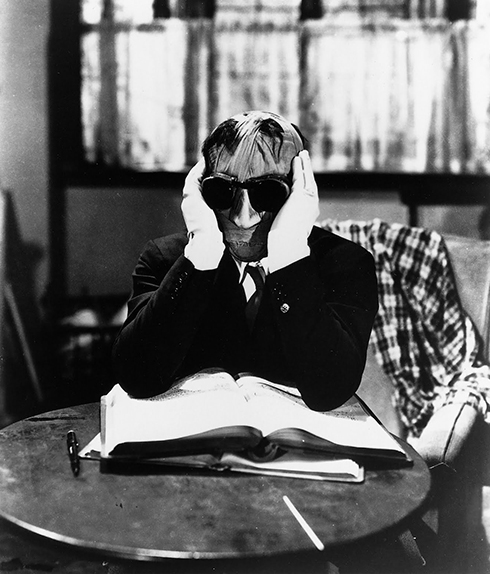
Jack Griffin (Claude Rains) is The Invisible Man (Universal 1933)
When confronted by Jaffers, Griffin pleads to be left in peace. Jaffers is intent on arresting Griffin for assault. Griffin rises from his chair and gives the onlookers one last warning:
“Stop where you are. You don’t know what you’re doing. All right, you fools. You’ve brought it on yourselves. Everything would have come right if you’d only left me alone. You’ve driven me near madness with your peering through the keyholes and gaping through the curtains. And now you’ll suffer for it! You’re crazy to know who I am aren’t you? All right, I’ll show you!”
Griffin removes his false nose, goggles and shouts: “There’s a souvenir for you! And one for you! I’ll show who I am and what I am!” Laughing maniacally, Griffin removes his facial bandages and hairpiece, showing his invisibility. Jaffers and the onlookers flee in panic. Once outside, a revelation becomes clear: “If he gets the rest of those clothes off, we’ll never catch him in a thousand years.” Griffin has removed all of his clothing except his shirt. When Jaffers renters the room he realises that handcuffing a “blooming shirt” is impossible. Griffin removes his shirt and, now completely invisible, throttles Jaffers and ploughs his way through the bystanders. Once outside, Griffin steals a bicycle (from a very young and uncredited Walter Brennan), and pedals off down the street to the amazement of the populace. Griffin then grabs a broom and strikes a civilian with it. Griffin gleefully knocks over a baby carriage, snatches a hat from an elderly gentleman and throws it into the pond. The people panic and take refuge behind locked doors. Jaffers calls his superior officer, Inspector Bird (Harry Stubbs), and when asked his location, Jaffers answers The Lions Head Inn. Bird doubts the story of an invisible man and tells Jaffers “to put more water in it next time.” Mr Hall confirms the story as panic begins to spread.
Meanwhile, at Griffin’s residence, Cranley and Kemp search for clues. Cranley finds a list of chemicals. On this list is a chemical called monocaine. According to Cranley, monocaine is a terrible drug made from a flower in India that draws color from everything it touches. Cranley recalls the drug was tried out on a dog. The animal turned “dead white” and also went raving mad. Cranley believes Griffin may not know of the experiment with the dog, as Cranley found it by chance in an old German book. Cranley decides to tell the police that Griffin’s disappeared and that’s all. He asks Kemp to not breathe a word of this. Cranley will see Inspector Lane.
That evening, Kemp is in his study reading and listening to the radio. As Griffin enters, the wind ruffles the table cloth and Kemp turns and sees no one. An announcement comes over the air waves:
“This is the national station broadcasting this evening’s news. Remarkable story from country village. Police and doctors are investigating an astonishing story told by the people of Iping. It appears that a mysterious disease has broken out infecting a large number of the inhabitants. It takes the form of a delusion that an invisible man is living among them. Several people have been seriously injured, probably through fighting among themselves… in their belief that their opponent is an invisible man. The whole village is in a state of panic, and everyone -“
The radio is mysteriously turned off and Griffin announces his presence:
“And everyone deserves the fate that’s coming to them—panic, death things worse than death. Don’t be afraid Kemp. It’s me, Griffin. Jack Griffin. How are you my friend? I’m frozen with cold and dead tired. Thank God for a fire.”
Kemp watches the chair move itself close to the fire and a log toss itself into the fireplace. This is becoming a little too much for Kemp. It is interesting that Kemp has a photograph of Flora on his mantelpiece. Whether or not Griffin notices this is not divulged. Griffin tells Kemp that he wants food and sleep. He also asks for a cigarette. Griffin then reveals his disdain of Kemp:
“You always were a dirty little coward Kemp. You’re frightened out of your wits, aren’t you? Oh, it’s no good talking like this. Have you got a good long surgical bandage? And a pair of dark glasses? Go and get them at once. Let me have a dressing gown, pyjamas, and a pair of gloves. You’ll feel better if you can see me, won’t you?”
Kemp tells Griffin where to find the pyjamas as he hands him the gloves and bandages. Kemp brings Griffin the glasses and is astonished to see the pair of pyjamas sitting in a chair, with neither feet nor head. Griffin tells Kemp to draw the blinds in his siting room. At the Lions Head Inn, a furious Inspector Bird conducts an inquiry. He accuses everyone of making a fool of him and that Mr Hall devised the scam to sell more alcohol. Meanwhile, at Kemp’s house, Griffin takes his colleague into his confidence:
“Now then, we can talk as man to man. One day, I’ll tell you everything. There’s no time now. I began five years age in secret, working all night, every night, right into the dawn. A thousand experiments, a thousand failures. And then, at last, the great, wonderful day. The great wonderful day! The last little mixture of drugs. I couldn’t stay here any longer, Kemp. I couldn’t let you see me slowly fading away. So I packed up and went to a little village for secrecy and quiet…to finish the experiment and complete the antidote, the way back to visible man again. I meant to come back just as I was when you saw me last. But the fools wouldn’t let me work in peace. I had to teach them a lesson.”
Kemp asks why do it? Griffin explains that it was just an experiment to do something no other man has done. However, in Griffin’s next bit of dialogue, it becomes obvious that the drugs are starting to take their toll on Jack’s sanity:
“But there’s more to it than that, Kemp. I know now. It came to me, suddenly. The drugs I took seemed to light up my brain. Suddenly I realised the power I held. The power to rule, to make the world grovel at my feet. We’ll soon put the world right now, Kemp. You and I – I must have a partner Kemp, a visible partner to help me in the little things. You’re my partner Kemp. We’ll begin with a reign of terror, a few murders here and there. Murders of great men, murders of little men, just to show we make no distinction. We might even wreck a train or two. Just these fingers around a signalman’s throat. That’s all.”
Griffin tells Kemp to get his car as they have to get back to the village of Iping to get Griffin’s notebooks. Kemp and Griffin journey back to Iping. Kemp is to wait outside while Griffin drops his notebooks out of the window. Inspector Bird is still conducting his inquiry while Griffin retrieves his books. Inspector Bird declares the whole incident a hoax. Griffin overhears this and throws ink in Bird’s face. Mrs Hall shouts: “He’s here! The invisible man!” Griffin throws glassware about, then kills Inspector Bird. Griffin runs out to Kemp’s car and tells his partner: “Had to take some exercise to keep warm. I killed a stupid little policeman. Smashed his head in. We start in earnest tomorrow morning, Kemp.” Cranley arrives at the police station to see Inspector Lane when the news breaks that: “Invisible Man Slays Policeman.” Cranley realises it’s useless to see Lane now and goes home.
Back at Kemp’s residence, Griffin explains some of the downsides of invisibility. He must hide for at least an hour after meals, for the food is still visible inside him until digested. Only working on fine clear days, and so on. Griffin states that they shall find ways of defeating everything. He bids Kemp goodnight and goes to bed. Back at the Inn, the body of Inspector Bird is taken away and the Chief of Detectives (Dudley Riggs) is now in charge. He assigns sections of the country to different officers. At 10:30, a broadcast warning to citizens is heard. There is also a call for volunteers. Meanwhile, a frightened Kemp calls Dr Cranley. Flora overhears the conversation, and her father admits that her beloved is the invisible man. The police receive many suggestions on how to catch the invisible man. One call is from a very young John Carradine.
Kemp calls Inspector Lane (Donald Stuart). Lane explains that he only has five men there and that he wants a hundred to surround the house. Cranley assures Flora that he and Kemp will undo this terrible experiment. Flora wishes to see Jack now, and her father refuses. Flora says that she will go alone then. As Kemp waits for the police, Griffin knocks on the door. He tells his partner a busy day is ahead and sleep is needed as a car drives up. Griffin thinks it is the police, but Kemp shows him that it is Dr Cranley and Flora. Griffin wants to see Flora alone.
What follows is one of the finest scenes in the film, for it shows the poignancy of a love that is slowly dissolving into madness. Flora enters the room and is shocked to see Jack swathed in bandages:
Jack: Flora, my darling.
Flora: Thank God you’re home Jack.
Jack: I would have come to you once, Flora, but for this. How wonderful it is to see you. How beautiful you look. That funny little hat, I always liked. You’ve been crying.
Flora: I want to help you. Why did you do this?
Jack: For you Flora. Yes, for you my darling. I wanted to do something tremendous; to achieve what men of science have dreamt of since the world began; to gain wealth and fame and honor; to write my name above the greatest scientists of all time. I was so pitifully poor. I had nothing to offer you Flora. I was just a poor struggling chemist. I shall come back to you Flora, very soon now. The secret of invisibility lies there in my books. I shall work in Kemp’s laboratory till I find a way back. There is a way back, Flora. And then I shall come to you!
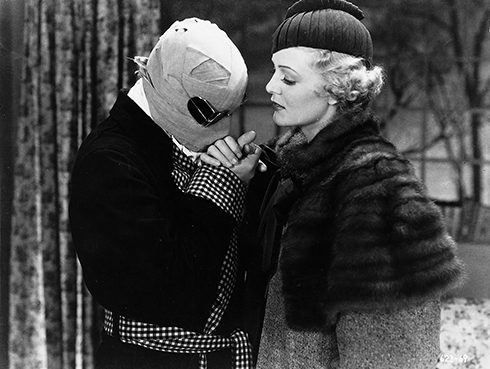
Claude Rains and Gloria Stuart in The Invisible Man (Universal 1933)
What is left of Griffin’s sanity begins to ebb away even more as he continues:
“I shall offer my secret to the world with all its terrible power! The nations of the world will bid for it — thousands, millions! The nation that wins my secret can sweep the world with invisible armies. Don’t you see what it means? Power! Power to rule! To make the world grovel at my feet! Power I said! Power to walk into the gold vaults of the nations, into the secrets of kings, into the Holy of Holies; power to make multitudes run, squealing in terror… at the touch of my little invisible finger. Even the moon’s frightened of me, frightened to death. The whole world’s frightened to death.”
The barking of dogs is heard as Inspector lane and the police have arrived. Griffin realises that Kemp has betrayed him. The police link hands together and surround the house. As Kemp opens the blinds in his study, Griffin makes him solemn promise:
“Thank you Kemp, for opening the window. You’re a true friend, Kemp, a man to trust. I’ve no time now, but believe me, as surely as the moon will set, and the sun will rise, I shall kill you tomorrow night. I shall kill you even if you hide in the deepest cave of the earth. At 10:00 tomorrow night, I shall kill you.”
As Kemp screams for help Griffin creates mayhem with the police. He grabs a constable by the legs and swings him around until the poor man loses his trousers, which Griffin takes. Down a lone, cold country road, a young woman screams as she is being chased by a pair of trousers, as Griffin gleefully sings: Here we go gathering nuts in May.
A frightened Kemp turns to the Chief of Police (Holmes Herbert) for protection. Dr Cranley is also being questioned. He is pressured into revealing who the invisible man is. Griffin begins killing members of the search parties. Griffin derails a train, walks into a bank, steals a cash drawer, and dumps it into the street for the passersby singing: Pop goes the Weasel. The Chief of Detectives holds a press conference. It is learned that Griffin has killed twenty men of the search parties and one hundred in the train disaster. An uncredited Dwight Frye is a reporter who suggests the ludicrous idea of putting wet tar on all the roads and then chasing the black soles of his feet!
A plan is devised to apprehend Griffin, using Kemp. The doctor is to be surrounded by police, who are draped with a net. Kemp is to be marched into the police station and disguised as a constable and driven back to his home. All goes as planned, except Griffin has seen through the trick, and is in Kemp’s car as he drives into the country. Kemp is overpowered, tied up, and placed in the front seat of his car. But before Griffin sends the car over the cliff – he sends his old partner off with a parting shot:
“I hope your car’s insured, Kemp. I’m afraid there’s going to be a nasty accident in a minute. A very nasty accident. Just sit where you are. I’ll get out and take the hand brake off and give you a little shove to help you on. You’ll run gently down and through the railings. Then, you’ll have a big thrill until for about a hundred yards or so until you hit a boulder. Then you’ll do a somersault and probably break your arms. Then a grand finish up with a broken neck! Well goodbye Kemp. I always said you were a dirty little coward. You’re a dirty, sneaking little rat as well. Goodbye.”
Laughing maniacally, Griffin sends Kemp’s car over the cliff. It bursts into flames and explodes as it hits the ground. The Chief of Police and Chief of Detectives hold a meeting to discuss viable ways of catching Griffin. Meanwhile, Griffin finds a barn, covers himself with hay and falls asleep. It begins to snow and the owner of the barn discovers Griffin asleep. The police realise that Griffin will seek shelter from the snow. At that very moment, the owner of the barn rushes in to see Inspector Lane. The police recognise a “golden opportunity” and decide not to take any chances. The police surround the barn and set it ablaze. Griffin is forced out into the snow. His footprints are visible and the Chief of Detectives fires two bullets into Griffin who falls unconscious.
Griffin is taken to the hospital. However, a doctor approaches the Chief of Detectives with a grim prognosis: “I don’t think your guard will be needed any longer. He’s very near the end.”
The doctor then approaches Cranley:
“Towards dawn this morning he grew quiet. He called the name of a girl – I understand your daughter, Dr Cranley. The bullet passed through both lungs. It’s impossible to treat the wounds. Do you think your daughter could bear to go to him? I afraid the end maybe rather terrible. The effect of the drugs will die with him. His body will become visible as life goes.”
As he lies dying, Jack Griffin asks for his beloved Flora one last time, just as Cranley and his daughter enter:
“I knew you would come to me, Flora. I wanted to come back to you. My darling, I’ve failed. I meddled in things that man must leave alone.”
Griffin’s life passes, and slowly, a skeletal structure appears, then muscle mass and finally the face and body of Claude Rains, aka Jack Griffin. The man who has held our attention for over seventy minutes with just his voice and mannerisms. Not only is The Invisible Man is one of the best films made by James Whale, but it is truly one of the greats from the first cycle of horror films by Universal Studios.
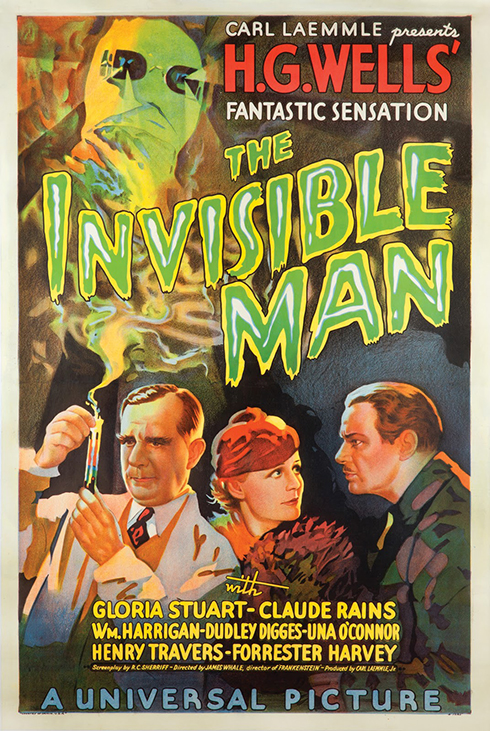
Original theatrical release poster for The Invisible Man (Universal 1933)
Article by Anthony Caranci.
Warning: Undefined variable $aria_req in /home/lassicmo/public_html/wp-content/themes/classicmonsters2/comments.php on line 8
Warning: Undefined variable $aria_req in /home/lassicmo/public_html/wp-content/themes/classicmonsters2/comments.php on line 13










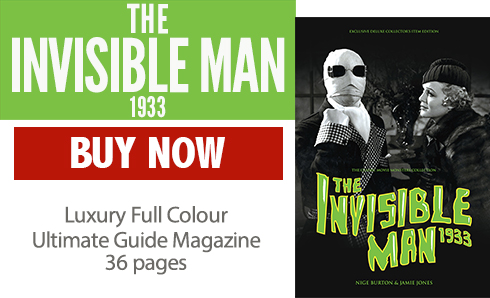

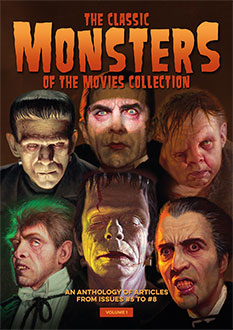
Was watching the TV show invisible man makes me wanting Claud rains in the original